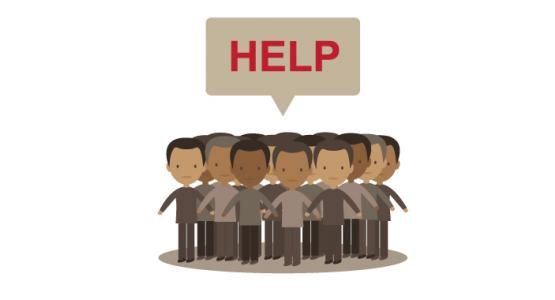
How can Adventist Churches Minister to Refugees in Their Neighborhoods?
Story by Edwin Manuel Garcia
The worldwide refugee crisis is prompting the United States to open its immigration doors to a larger number of people from regions in turmoil. According to the United States Department of State, nearly 70,000 refugees came to the U.S. last year—the world’s top resettlement location—yet recent political instability in Asia, Central America, the Middle East and Africa will boost admissions to 85,000 this year and 100,000 in 2017.
This dramatic increase will undoubtedly enhance the chances that families fleeing persecution may move into our communities in the near future. How should Seventh-day Adventists respond when refugees from Syria, Burma, Iraq, Honduras, Guatemala and other nations become our neighbors?
Extend a Helping Hand
“The church can become like an extended family for refugees coming to the United States, and we can focus on a more holistic engagement with their physical needs, then social, mental and eventually spiritual needs,” says Sung Kwon, executive director of the North American Division’s Adventist Community Services, which runs Adventist Refugee and Immigrant Ministries.
That’s when church organizations play a major role. According to the U.S. Department of State, faith groups assist about 70 percent of refugees who resettle in the U.S. Adventist churches across the country have been helping refugees learn significant skills that help them assimilate into their new communities, such as how to speak English, navigate a grocery store, read nutrition labels and use a gas stove. They also give them driving lessons.
__________________________________________________________________________________________
Click here for tips on starting a refugee ministry __________________________________________________________________________________________
Some congregations in the Columbia Union have firsthand experience in adopting refugees in their local communities. These churches are actively, if not proverbially, feeding, clothing and providing shelter for the displaced people.
Ebenezer Church Becomes a “Safe House”
When a resettlement agency contacted Allegheny East Conference’s Philadelphia Ebenezer church about working with a family of eight Adventists arriving from refugee camps in the Republic of Congo, the congregation jumped at the opportunity.
At first, communicating with the new members was difficult, recalls Crystal Drake, who is a leader in the church’s refugee ministry. “We did a lot of pointing and gesturing trying to get our message across,” she says.
The church decided to purchase translation equipment and hired an interpreter for the sermons. They obtained Sabbath School lessons in the Kinyarwanda language. They organized a thrift store giveaway to provide clothing, small appliances, cookware, bedding and televisions to the displaced families. They raised money for school uniforms and winter clothing. They sought volunteer van drivers to transport the refugees to church. They sent social workers and English teachers to the newcomers’ homes. Longtime Ebenezer families adopted Congolese families and met often to socialize. They also consoled refugees fired from jobs for refusing to work on Sabbath.
The number of Congolese refugees grew to 75. “The church accepted them as brothers and sisters,” says Drake, adding that the immigrants referred to the church as their “safe house.”
Unfortunately, the resettlement agency was unable to provide meaningful employment, drastically curtailing the thriving ministry and forcing the refugees to relocate away from the area. This resulted in tearful goodbyes, says Drake. “I believe our church gained more than we gave. We were able to witness, up close, why we need to be thankful and faithful.”
Today some Ebenezer members use Facebook to stay in contact with their Congolese friends. Meanwhile, the church took in a new, five-member refugee family, also from Congo.
Have a caring heart
Three refugee families from Rwanda and Burundi have been a blessing to Potomac Conference’s Charlottesville (Va.) church, a congregation with 100 members. The International Rescue Committee, a major resettlement agency, introduced the displaced families to the members.
To this church, refugee outreach ministry means sending someone to help the newcomers set up a Wi-Fi connection, complete school applications, drive parents to teacher conferences, assist children with homework and serve as a reference on job applications, among other duties.
“Imagine being uprooted, placed in some country across the world, not speaking the language, and being told to figure it all out,” says Pastor Daniel Xisto.
One time a Charlottesville member went to the home of an African refugee and found her lying on the couch, gravely ill. When the member asked the refugee if she had been to the doctor, the refugee said she didn’t have enough money. Xisto adds, “Our member asked her if they accepted the insurance that the International Rescue Committee set them up with, to which she responded, ‘What is insurance?’”
Some of the 11 individuals among the three refugee families were Adventist before getting settled in Virginia, and they now serve as deacons, praise leaders, audiovisual technicians, kitchen staff and Bible study leaders at the church.
The experience in Charlottesville has been a blessing and learning opportunity for the refugees and congregants. Karen M. Flowers, a church elder, says, “As our journeys merge, we become increasingly aware of just how difficult it can be for an immigrant family to make their way in a strange, cultural setting, and among many who do not fully appreciate their journey,”
Pastor Xisto recommends other churches participate in similar outreach. All it takes is volunteers who are patient and willing to help, he says. “No PhD in foreign policy is required; just a caring heart. Anyone can help.”
Kwon adds that participating in refugee outreach ministry provides congregations with a unique opportunity to share their faith. He points to a church near San Diego, Calif., with a successful refugee outreach program that has resulted in hundreds of baptisms. He warns, however, “Don’t just look at people as prospects for membership growth, but as precious souls who belong to God,” Kwon says. “You want to genuinely care for them, and help them. That’s how Jesus lived His life.”

Add new comment